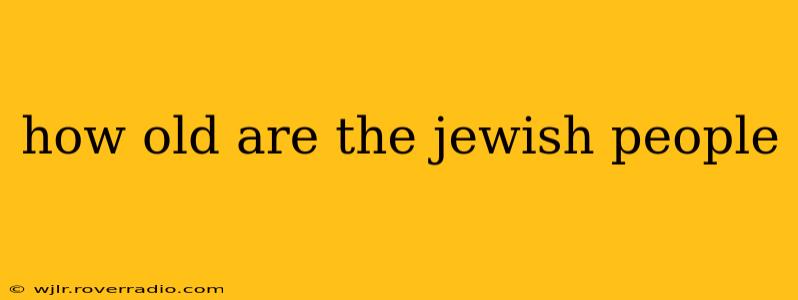How Old Are the Jewish People? A Look at Jewish History and Identity
The question of how old the Jewish people are is complex and depends on how you define "Jewish people." There's no single, universally agreed-upon answer, as it involves religious, historical, and genetic factors. It's not simply a matter of a specific birthday or founding date. Instead, it's a continuous journey spanning millennia.
What Does it Mean to Be Jewish?
Before tackling the age question, it's crucial to understand what defines Jewish identity. Judaism is not just a religion; it's a complex tapestry woven from religious beliefs, cultural practices, historical experiences, and a shared ancestral lineage. This intertwining makes it difficult to assign a precise age.
Some define Jewish identity through religious observance – following Jewish law (Halakha) and participating in Jewish rituals. Others emphasize cultural practices, like celebrating holidays or speaking Yiddish. Still others focus on lineage, tracing their ancestry back through generations to Jewish ancestors. Many people identify with a combination of these factors.
Tracing Jewish History: From Abraham to Modern Times
Tracing Jewish history back to its origins, many point to Abraham, a patriarch whose story is central to Judaism, Christianity, and Islam. While the exact historical accuracy of the accounts in the Torah (Jewish scriptures) is debated by historians and archaeologists, the narrative places Abraham's life roughly 4,000 years ago. This establishes a significant timeframe for the development of Jewish identity and traditions.
The Jewish people's history continued through the Exodus from Egypt, the establishment of the Kingdom of Israel, the Babylonian exile, and the subsequent diaspora. This diaspora, the scattering of Jewish communities across the globe, has resulted in diverse Jewish cultures and traditions but a consistent sense of shared identity. The continuous preservation of Jewish identity and religious practices across this vast geographic and temporal span is remarkable.
The Genetic Perspective: DNA and Jewish Ancestry
Recent advancements in genetic research offer insights into the genetic history of Jewish populations. Studies have identified shared genetic markers among Jewish communities worldwide, supporting the idea of a common ancestry. However, these studies also highlight the significant genetic diversity within Jewish populations due to centuries of intermarriage and migration. Genetic studies provide a compelling, albeit indirect, way to understand the longevity of Jewish identity.
Are Jewish People 4,000 Years Old? A nuanced answer
While the narrative of Abraham provides a significant historical anchor, it's crucial to avoid overly simplistic answers. To say the Jewish people are "4,000 years old" is a shorthand that oversimplifies a complex and evolving historical reality. Instead, a more accurate representation would be to recognize the Jewish people as having a continuous history and evolving identity spanning millennia, with deep roots tracing back to ancient times and ongoing development throughout the ages.
What are some key events in Jewish history?
This question delves into the rich tapestry of Jewish history. Key events include the Exodus from Egypt, the giving of the Torah at Mount Sinai, the establishment and destruction of the First and Second Temples in Jerusalem, the various periods of exile and diaspora, the rise of Rabbinic Judaism, and the establishment of the modern State of Israel in 1948. Each of these events significantly shaped Jewish identity and culture.
How has Jewish identity changed over time?
Jewish identity has constantly adapted and evolved throughout history. The influence of various cultures, periods of persecution and oppression, and the development of new theological and philosophical interpretations all played a part. Yet, despite these changes, a core sense of identity has persisted, albeit expressed in diverse forms across various communities.
In conclusion, the age of the Jewish people is not a matter of a single number but rather a continuous narrative stretching back thousands of years. It's a history of resilience, adaptation, and the preservation of a unique culture and identity. Understanding this history requires considering religious texts, historical accounts, genetic research, and the ongoing evolution of Jewish identity itself.
